Filter by

Emerging States and Economies: Their Origins, Drivers, and Challenges Ahead
This open access book asks why and how some of the developing countries have “emerged” under a set of similar global conditions, what led individual countries to choose the particular paths that led to their “emergence,” and what challenges confront them. If we are to understand the nature of major risks and uncertainties in the world, we must look squarely at the political and economic…
- Edition
- 1
- ISBN/ISSN
- 9789811326349
- Collation
- X, 177hlm,: ill, lamp;
- Series Title
- -
- Call Number
- -
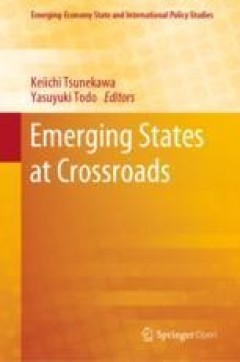
Emerging States at Crossroads
This volume analyzes the economic, social, and political challenges that emerging states confront today. Notwithstanding the growing importance of the ‘emerging states’ in global affairs and governance, many problems requiring immediate solutions have emerged at home largely as a consequence of the rapid economic development and associated sociopolitical changes. The middle-income trap is a…
- Edition
- -
- ISBN/ISSN
- 9789811328596
- Collation
- XIII, 293, hlm,: ill, lamp;
- Series Title
- -
- Call Number
- -
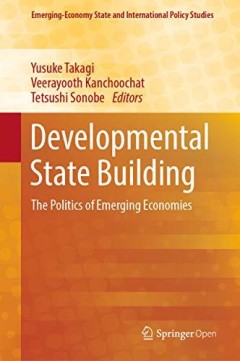
Developmental State Building
This open access book modifies and revitalizes the concept of the ‘developmental state’ to understand the politics of emerging economy through nuanced analysis on the roles of human agency in the context of structural transformation. In other words, there is a revived interest in the ‘developmental state’ concept. The nature of the ‘emerging state’ is characterized by its attitude t…
- Edition
- -
- ISBN/ISSN
- 9789811329043
- Collation
- -
- Series Title
- -
- Call Number
- -
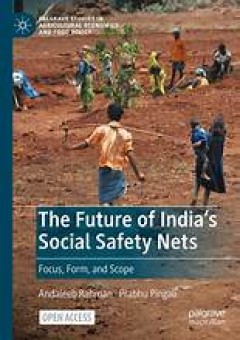
The Future of India's Social Safety Nets
India has learned what to do and what not to do when it comes to implementing policy to address human suffering. The COVID-19 pandemic unified the international response in similar ways, and the world has a lot to learn about key initiatives in India that have been implemented since India's independence. This open-access book includes key learnings about the conceptualization, design, and impac…
- Edition
- 1
- ISBN/ISSN
- 978-3-031-50747-2
- Collation
- -
- Series Title
- Palgrave Studies in Agricultural Economics and Food Policy
- Call Number
- XXIX, 439

Ireland's Long Economic Boom
This Open Access book examines the long economic boom experienced in Ireland between the late 1980s and 2007, analysing why this boom occurred.
- Edition
- 1
- ISBN/ISSN
- 978-3-031-53070-8
- Collation
- -
- Series Title
- -
- Call Number
- XVI, 264
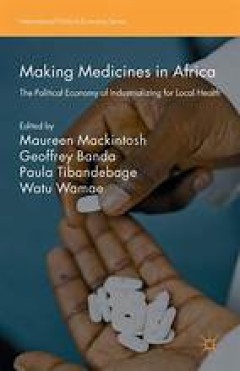
Making Medicines in Africa
This book is open access under a CC-BY license. The importance of the pharmaceutical industry in Sub-Saharan Africa, its claim to policy priority, is rooted in the vast unmet health needs of the sub-continent. Making Medicines in Africa is a collective endeavour, by a group of contributors with a strong African and more broadly Southern presence, to find ways to link technological development,…
- Edition
- 1
- ISBN/ISSN
- 978-1-137-54647-0
- Collation
- -
- Series Title
- International Political Economy Series
- Call Number
- XXI, 334

Special Economic Zones in India; Status, Issues and Potential
This book examines India’s ten years of experience developing Special Economic Zones (SEZs) and the performance of SEZs in the context of India’s growing international engagement, its endeavours to attract domestic and foreign investment in manufacturing and services and its aim to increase and diversify exports of goods and services. SEZs are industrial enclaves/clusters within a country t…
- Edition
- -
- ISBN/ISSN
- 978-81-322-2806-6
- Collation
- -
- Series Title
- -
- Call Number
- -

Indian Agriculture Towards 2030
This open access book brings together varying perspectives for transformational change needed in India’s agriculture and allied sectors. Stressing the need of thinking for a post-Green Revolution future, the book promotes approaching this change through eight broad areas, indicating the policy shifts needed to meet the challenges for the coming decade (2021-2030). The book comprises of ten…
- Edition
- 1
- ISBN/ISSN
- -
- Collation
- -
- Series Title
- India Studies in Business and Economics
- Call Number
- XV, 311

Future Intelligence
The first quarter of the 21st century introduced the world to rapid uncertainty, be it the social-political and financial crises, or pandemics, or the shaking up of well-established democracies with an increasing rise in populism. At the same time, the technological promise has taken off with automation, artificial intelligence, and nanotechnologies increasingly becoming an economic reality. Th…
- Edition
- -
- ISBN/ISSN
- 978-3-031-36381-8
- Collation
- XXII, 241
- Series Title
- -
- Call Number
- -
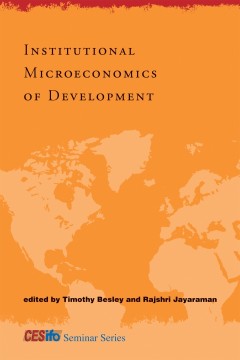
Institutional Microeconomics of Development
"The narrative of development economics is now infused with discussions of institutions. Economists debate whether institutions-or other factors altogether (geography, culture, or religion)-are central to development. In this volume, leading scholars in development economics view institutions from a microeconomic perspective, offering both theoretical overviews and empirical analyses spanning t…
- Edition
- -
- ISBN/ISSN
- 9780262289184
- Collation
- 1 online resource (x, 250 pages) :illustrations.
- Series Title
- -
- Call Number
- -
 Computer Science, Information & General Works
Computer Science, Information & General Works  Philosophy & Psychology
Philosophy & Psychology  Religion
Religion  Social Sciences
Social Sciences  Language
Language  Pure Science
Pure Science  Applied Sciences
Applied Sciences  Art & Recreation
Art & Recreation  Literature
Literature  History & Geography
History & Geography